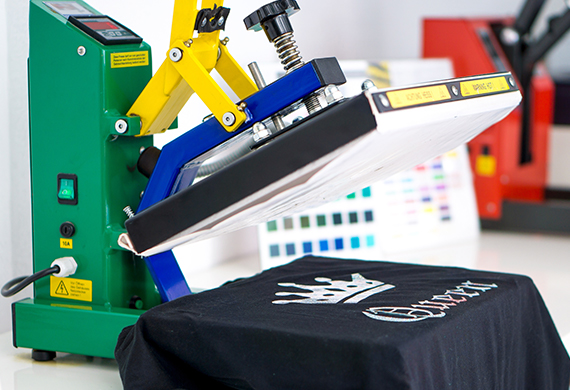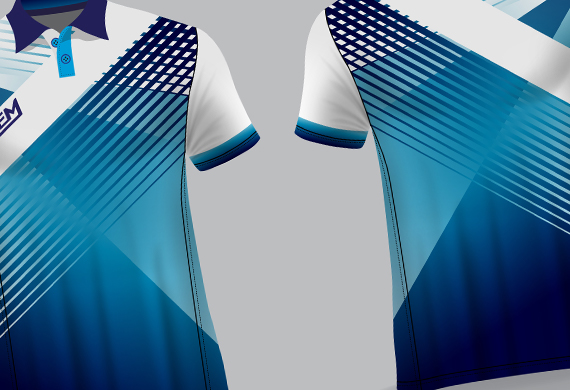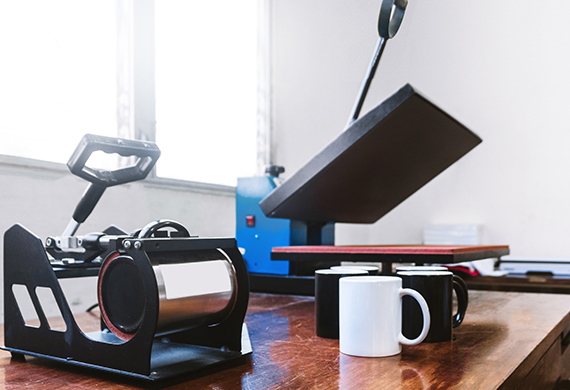Avoid being forced to use old printing styles to try and accomplish your marketing and advertising needs. Knowing what sublimation printing is and how it works will help you produce more attractive and marketable products.

clashgraphics.com gathered information about sublimation printing, how the process works, and answered some frequently asked questions.
Sublimation Printing Definition
Sublimation (dye sublimation) printing is a process that first prints text or images onto special transfer paper, then transfers that from the paper to another material (typically polyester or a polyester mix). The ink is then heated until it disintegrates (sublimates) into the fabric.
How Does Sublimation Printing Work
Sublimation printing uses heat and pressure to bring ink and fabric together as one.
First, a design or text is printed onto special transfer paper. These specialized inks turn into gas when brought under heat (sublimation), then combine with the fabric, permanently printing its content onto the fabric. The results are permanent and much less prone to fading, as the ink is embedded in the fabric or substrate rather than resting on it like a standard print.

This printing process is quite similar to getting a tattoo, but instead of skin, it’s for a chosen product. Heat opens the substrate’s pores, then with applied pressure, the ink cools and returns to a solid form.
The result is a permanent, full-color image that won’t crack, peel, fade, or wash away from the substrate. This process sees the ink go from a solid to a gas without turning into liquid. The conversion is initiated by heat, then controlled by pressure.
Pros of Sublimation Printing
The most exciting benefit of sublimation printing is the absolute freedom you have with your designs, which is not always the case with other printing methods.
You can go as design crazy as you like. You can print an entire t-shirt that looks like a stapler? Or a cow jumping over the moon with a galaxy background? You may choose to keep it classy with an outline or photo of a famous city skyline or landscape. The possibilities are truly limitless.
Design longevity is another pro, with a design that won’t crack, peel or fade. Even after being washed in the washing machine multiple times, your garment will likely fall to pieces before the printed design fades.
Sublimation printing is most suitable for smaller orders, seam-to-seam designs, and garments with a large number of design variations and applications.
Cons of Sublimation Printing
Sublimation printing cons are seen mostly with the selection of fabric materials. Sublimation printing is only suitable for garments that include polyester (100% polyester or a polyester blend). Although sublimation can be applied to other materials like cotton, the image will not be permanent.
If you are aiming for a vintage or distressed look, choosing a fabric or garment with a lower percentage of polyester content would certainly give you that finish.
Another potential challenge is white creasing. Sublimation works by printing a design into white fabric, and if there are spaces in the garment that are unreached by the sublimed design, they’ll remain white. This can occur from accidental folding or moisture accumulated on the transfer paper.
Frequently Asked Questions
Question: Is Sublimation Better Than Screen Printing?
Answer: If you have extra money to spend and plan on creating shirts with photo-realistic designs, or only plan on small printing runs, sublimation is your best option. However, if you are planning large runs or are trying to start doing garment customization on a restricted budget, screen printing may be your preferred option. Read more about sublimation and comparisons of print methods at 'Benefits of Screen Printing vs. Sublimation and Offset vs. Digital Printing'.
Question: What Items Can I Sublimate to?
Answer: Sublimation printing possibilities are practically endless. Consider the following:

- coffee mugs
- travel cups
- earrings
- wallets
- wine totes
- purses
- canteens
- business cards
- hats
- wine tumblers
- blankets
- pillowcases
- sheets
- bags
- shirts
- socks
- towels
- dog collars
- flags
- bracelets
- ornaments
- keychains
- phone cases
- puzzles
- totes
- coasters
These items can be printed for use around your household or developed and produced in larger quantities and marketed to the public.
Question: Can you use a regular printer for sublimation?
Answer: Sometimes. Printers utilizing a Micro Piezo printing head can be used for sublimation printing. Before this transition can occur, the system must be completely flushed. The color and chemical makeup of the two ink types are not the same.
Question: Which is better, heat transfer or sublimation?
Answer: If your business or hobby focuses on white and light-colored polyester apparel, sublimation printing is a great option. Your prints will have the greatest durability and washability. However, if you want the flexibility to print on any color garment or material type, heat transfer will be a better option.
Question: What are other examples of sublimation?
Answer: Sublimation is when a solid substance bypasses its liquid form and goes directly to its gaseous state. Some examples include:
- Dry Ice
- Mothballs
- Iodine at 100°C
Sublimation occurs all around us all the time. While this technology is relatively new in the printing industry, it is a common and ancient occurrence in nature.
Sublimation Printing
In this article, you discovered information about sublimation printing, how it works, some of its pros and cons, and answers to several frequently asked questions.
Sublimation printing will help you design, craft, and print more eclectic and desirable products that won’t fade, peel, or wash away.
Not using sublimation printing can severely limit the quality of your final products and cost you revenue from an unforgiving client base.
Sources:
makingcenter.parsons.edu/wp-content/uploads/2016/09/DyeSub_2021.pdf
chem.ucla.edu/~harding/IGOC/S/sublimation.html
citeseerx.ist.psu.edu/viewdoc/download?doi=10.1.1.378.2831&rep=rep1&type=pdf
Clash Graphics Print Shop Atlanta Flyer Printing
2233 Peachtree Rd NE Ste 202 Atlanta, GA 30309
(678) 235-3464
To view the original version on Clash Graphics, visit: https://www.clashgraphics.com/printing-tips/what-is-sublimation-printing/